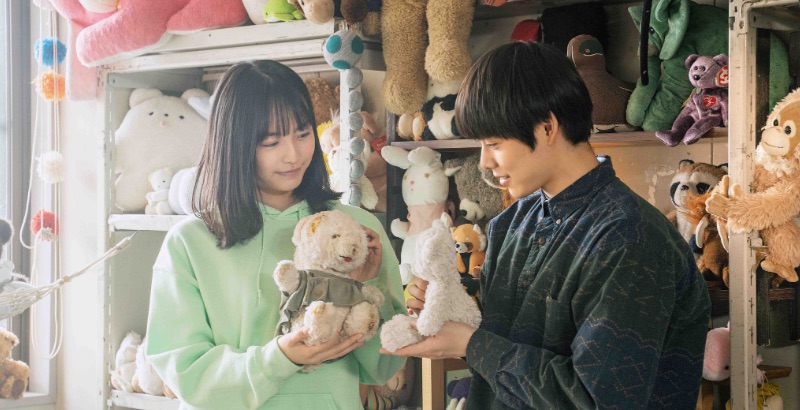
With an outpouring of empathy, People Who Talk to Plushies are Kind (Nuigurumi to shaberuhito ha yasasii) playing at this year’s Japan Cuts, offers a compassionate look at the severity of loneliness in modern society. Despite its soft aesthetic, aided by the title and general nature of the film, there’s a sorrowful story at its core, uplifted by notes of necessary optimism. Without judgment, director Yurina Kaneko delivers a film that inquires into those who would seek comfort and solace from plushies while a deeper question of what led us to this place lies underneath.
Adapted from the novella People Who Talk to Stuffed Animals are Nice by Ao Omae, People Who Talk to Plushies are Kind follows three recent college students, Nanamori (Kanata Hosoda), Mugito (Ren Komai), and Shiraki (Yuzumi Shintani). For different reasons, all three are drawn to the student-run Plushies Club. Instead of being a club dedicated to the making of plushies, it’s instead become a homestead for introverted and withdrawn young adults. Members of the club — dubbed the PLC — spend their time speaking with the plushies, confessing anything from things that trouble them to inconsequential daily observations. There are only two rules of the club. The first is that they all wear headphones while there to give privacy to the others’ conversations. The second is always to treat the plushies with respect.
The PLC offers space to those who are hurt. A soft surrounding exterior gives a protective bubble from a world that’s harmed the members of it. From sexual harassment, depression, bigotry, and our protagonist’s struggle with self-discovery of being asexual and aromantic, the club members have endured plenty of hardships. The PLC, as a character puts it, shelters those who are feeling low and at odds with the world and themselves without casting judgment. It’s one of the few places where people can go to feel alone and bereft together.
Mugito, who suffers from depression, believes it necessary for society to have these places to recede into. Shiraki, who doesn’t speak to plushies herself but appreciates the security of the club, agrees but is more dubious. She believes that only interacting with safe spaces is becoming weak in a world that offers so few.

This touches on one of the most striking elements of the film, which is the ongoing discussion of the sexual harassment women face. From watching strangers grope women on trains to Shiraki’s own experiences with it in her other extracurricular club, they’re well inundated with the hardships of their world. It’s why both seek the solace of the Plushies Club. Even Nanamori can identify that simply by existing; he poses a threat to other women, this being demonstrated as he walks home at night as a woman walks ahead of him, silently speeding up despite his ambling pace.
The thematic nature of the film showcases the struggles of isolation, and the need for human companionship enriches the story, especially as it struggles in other areas. There’s a charm to the direction when it positions the camera to appear from the POV of the plushies the characters speak to, but it’s distracting. It takes away from the story’s weight, playful in a way the rest of the film isn’t. There’s an air of dreamlike surrealism in these moments and others where giant, plushie paws reach around to cover Nanamori’s ears to quiet the very loud world around him, reminiscent of Michel Gondry’s The Science of Sleep. They’re just too clumsily incorporated into the story and, instead, pull us out of the drama.
The film finds its greatest moments of grace through small moments. From Shiraki and Mugito cleaning a plushie together to picking up scraps of trash and the respect given to flower and pet memorials, the kindness the story suggests is found in these small, quiet instances. As the characters reckon with their inability to talk to others being counteracted by their desperate desire to be heard, we watch as they interact with a world that’s been cruel to them with responding kindness.
Compassionate and written with a curious and reflective tone that understands the vastness of the big questions the film is pondering regarding masculinity, isolation, and mental health, People Who Talk to Plushies are Kind is a distinctive story. Through quiet contemplation and empathy for its characters, the film, like the PLC, offers space for introspection as we watch these ordinary characters living ordinary lives offer life-saving room for change and camaraderie.
People Who Talk to Plushies are Kind plays at Japan Cuts 2023.
People Who Talk to Plushies are Kind
-
Rating - 7/107/10
TL;DR
Compassionate and written with a curious and reflective tone that understands the vastness of the big questions the film is pondering regarding masculinity, isolation, and mental health, People Who Talk to Plushies are Kind is a distinctive story.






